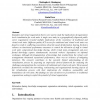Free Online Productivity Tools
i2Speak
i2Symbol
i2OCR
iTex2Img
iWeb2Print
iWeb2Shot
i2Type
iPdf2Split
iPdf2Merge
i2Bopomofo
i2Arabic
i2Style
i2Image
i2PDF
iLatex2Rtf
Sci2ools
ECIS
2003
2003
From traditional to virtual organisation: implications for work unit boundaries
Boundary and virtual organisation theory were used to study the implications of organisation level virtualisation for work units. A single case study in a geographically dispersed public sector organisation revealed multiple implications of the coexistence of traditional and virtual work units. Different quality ICT access for traditional and virtual work units was found to result in conflicting expectations about the speed of information sharing. Exclusive reliance on time-based performance measures to control the allocation of staff to virtual work units compromised knowledge sharing, whilst virtual team arrangements and poor formal knowledge capture simultaneously increased workers’ dependence on informal exchanges. Although the fragmentation of knowledge that resulted from the virtual work arrangements threatened operational performance, there was no evidence of mitigating initiatives. The research contributes to the currently limited understanding of the virtualisation process ...
| Added | 31 Oct 2010 |
| Updated | 31 Oct 2010 |
| Type | Conference |
| Year | 2003 |
| Where | ECIS |
| Authors | Christopher J. Hemingway, Karin Breu |
Comments (0)

